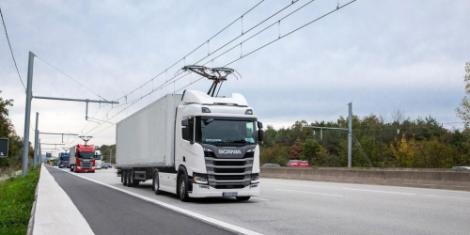Electrification of trucks
January 2025
The transport sector is the largest emitter of greenhouse gas emissions. But the introduction of measures to accelerate the sector’s decarbonisation heralds a virtuous evolution. Agnès PANNIER-RUNACHER, the French Minister for Ecological Transition, Marc FERRACCI, the French Minister for Industry and Energy, and Philippe TABAROT, the French Minister for Transport, paid tribute to the success of the support schemes introduced by the French government to help road transport professionals move towards electrification of their fleets.
To download : e-trans_-_cahier_des_charges_-_v2_-_2024.pdf (3.2 MiB)

With the transport sector still the biggest emitter of greenhouse gas emissions, the government has launched the E-trans scheme to provide €130.2 million in funding for the sector’s decarbonisation through energy saving certificates (CEE). A window for SMEs has also been opened, along with a call for projects. These measures are also complemented by the Advenir programme, which will accelerate the deployment of charging stations for electric heavy goods vehicles.
E-Trans: a scheme that will double the number of new electric HGV registrations by 2025
This first scheme targets small and medium-sized enterprises (SMEs), for whom the cost of battery-powered electric vehicles is a major obstacle, followed by all the players in the sector. The aim is to accelerate the deployment of battery-electric heavy-duty vehicles in order to decarbonise the main road transport flows and routes for goods and passengers, and in dense and/or low-emission mobility zones (ZFE-m).
It will support 674 projects, representing 2,162 heavy goods vehicles and 369 coaches and buses. This support is significant for the heavy-duty electric vehicle market in France, since it represents a 2-fold increase in the number of new HGV registrations compared with 2024, and a 50% increase for coaches and buses. The expected environmental benefit is around 120,000 tCO2eq avoided each year.
137 SMEs supported through the dedicated window
In 2024, this scheme supported 137 projects to purchase or lease electric heavy goods vehicles, with an allocated budget of €20 million in aid. The beneficiary companies, small and medium-sized, were able to acquire or lease electric vehicles in categories N2 and N3, thereby helping to avoid 17,700 tonnes of CO2eq per year. These initiatives mainly concern the freight, distribution and food industry sectors. This SME scheme has financed the acquisition or leasing of 251 electric heavy goods vehicles, including 163 road tractors (category N3) and 88 rigids (category N2 & N3), with an average grant of €65,000 per vehicle.
537 projects selected under the call for projects
This call for projects supported 537 projects for the acquisition, leasing or retrofitting of heavy electric vehicles, with an allocated budget of €110.2 million in aid. The beneficiary companies and Mobility Organising Authorities were able to acquire or lease electric vehicles in categories N2, N3, M2 and M3, thereby helping to avoid 102,200 tonnes of CO2eq per year. This call for projects financed the purchase or lease of 2,280 heavy electric vehicles, including 988 road tractors (category N3) and 923 straight trucks (category N2 & N3) with an average grant of €61,600 per vehicle, 141 buses (category M2 and M3) and 228 coaches (category M3) with an average grant of €57,100 per vehicle.
Advenir: a scheme to develop charging points for heavy goods vehicles
In addition to financial support for the purchase or lease of battery-electric heavy-duty vehicles, the CEE Advenir programme provides funding for the installation of recharging points for heavy-duty vehicle fleets.
By 1 January 2025, 972 recharging points had been deployed at transport depots, representing €5.1 million in committed premiums. In addition, by 1 January 2025, there were 24 charging stations accessible to or dedicated to heavy goods vehicles, open to all.
Finally, a master plan for the deployment of charging stations for heavy goods vehicles has been drawn up for the national road network.
In order to continue supporting the sector in 2025, the standardised CEE TRA-EQ-129 operation sheet dedicated to the purchase or hire of a new electric heavy goods vehicle or one resulting from an electric retrofit operation has been available since 1 January.